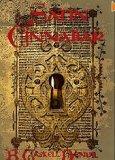We asked our new branch member, Barbara Gaskell Denvil, about her personal background in writing Satin Cinnabar, wonderful novel set in Ricardian times. Here is her answer:
 I’ve always been attracted to English medieval history, being taken around castle ruins as a child, smelling that old damp mystery and the insistent intrigue of long forgotten secrets. So I read a considerable amount on the subject over the years but it wasn’t until a comparatively short ago when I wanted to start writing full length novels, that I became more consistently involved and studied in greater depth.
I’ve always been attracted to English medieval history, being taken around castle ruins as a child, smelling that old damp mystery and the insistent intrigue of long forgotten secrets. So I read a considerable amount on the subject over the years but it wasn’t until a comparatively short ago when I wanted to start writing full length novels, that I became more consistently involved and studied in greater depth.
I come from a literary family (my sister is an author and my father was a playwright) and so started young myself, working for BOOKS AND BOOKMEN as a critic and publishing numerous short stories and articles. But after a tortuous marriage and producing three daughters, I needed escape. I explored the Mediterranean and its islands for many years but when my much loved partner died, I looked to escape again. Perhaps I am simply dedicated to escapism. Hence Australia (I am half Australian, half British) and the call of the novel.
Medieval England was the inspiration I needed and so once again I picked up my researches. Like so many Ricardians, I actually delved into the latter half of the 15th century after falling for the charismatically dastardly Richard of Shakespeare’s imagination. The wild exaggerations apart, I was quite prepared to believe in a ruthless king who did anything for power and deserved his ignominious end. Not that I was in favour of Henry Tudor’s usurpation I hasten to add, for my reading had already shown him to be a coldly calculating and devious creature who I did not warm to at all. But – shamefully – my researches up until then had not given a single clue as to Richard’s real character, and that Tudor propaganda continues to reign 500 years later is an absolute disgrace. Hail the Richard III Society.
Back to the point! I was looking for a delightfully evil king but I was soon disappointed. The man I discovered, even in those books which despised and insulted Richard, was a person of responsible authority, a man who lived according to high standards, a man who respected his wife (whether or not there was any genuine romance) and who – if indeed he usurped the crown – did so for very good reasons. Then I moved on to Paul Murrey Kendall, and the usurping, murdering hunchback of outrageous villainy was lost to me forever.
So I did not choose my opinion – the truth of Richard’s character was forced on me through my researches and now this much maligned king heads the very short list of my historical ‘heroes’ and the only one who was possibly heroic in fact.
SATIN CINNABAR is a very small, very indirect tribute to the man I now so greatly admire, but my story is based more especially in the medieval London which fascinates me so much. I do not claim to be an historian or expert of any kind, but I know a good deal of what it was like to live then, and I have never read another book which attempts to bring that teeming, suffocating, wayward atmosphere to life. I have also long been haunted by the great battles of history, and the incredible toll they took not just on those who had to fight them, but on the relatives left behind, the ruined countryside, and the wandering shadows left to trouble men’s dreams. If ghosts do indeed exist, then what must have tramped across England’s battered pastures for so many long wretched years? We have recently come to understand something of the mental anguish now experienced by men who have witnessed appalling suffering in war. How much more did simple men feel 500 years ago when the cause they fought for was barely understood, and when they stood face to face with a neighbour, hacking desperately at his face as he hacked at yours? Surviving such butchery must have been the cause of thousands of lifetimes haunted by a hundred thousand nightmares. So that is where I began my book, during the aftermath of Bosworth, and the misery it spread then and afterwards.
But this book is no tragedy. Certainly many historians accept that the people of the past thought entirely differently to us, being influenced principally by the standards of the time, the habits of a backward society and of a domineering church. But as a good reading of more down to earth contemporary writing supports, I believe that human nature changes remarkably little. The people of the past had to accept the limitations forced on them, but they were not so different at heart. And that is how I have written this book. I just hope my readers find some enjoyment in my writing.
SATIN CINNABAR is published online for all formats, Amazon Kindle, ipad Barnes & Noble etc..
Please feel free to visit Barbara’s blog!
Tags: Books, Richard III

[…] here more about Barbara and the background behind this wonderful […]